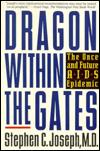Michael Fumento
Factual · Powerful · Original · Iconoclastic
Report from the AIDS Frontier
January 01, 1993 · Michael Fumento · Investor’s Business Daily · Aids
As New York City health commissioner from 1986 to 1990, Stephen Joseph found himself increasingly swept up in the bizarre world of AIDS and politics — a pairing which, alas, is essentially redundant.
By the time he stepped down, when his boss Ed Koch did, Dr. Joseph had been lambasted by AIDS activists as a lying, murdering pig and by conservatives as a virtual narcotics pusher. His Dragon Within the Gates is one of the "7 million stories in the Naked City" that is of particular interest.
Most of Dr. Joseph’s trouble with the AIDS activists arose out of the Department of Health’s decision in 1988 to halve its estimate that 400,000 New Yorkers were infected with the AIDS virus, HIV. The earlier estimate had been based on extrapolations from shaky data (such as Alfred Kinsey’s estimate of the percentage of men who are homosexual), while the new estimate was based on a simple extrapolation from the rate at which new AIDS cases were coming in and the known incubation period of the virus.
Anyone not familiar with the politics of AIDS might have thought that homosexual activists would be delighted to hear that only half of their number would sicken and die as had been projected. But in a nation in which AIDS is receiving 20 times the research funding per patient as is cancer, nothing is more important to AIDS activists than exaggerating the number of persons who are going to get AIDS and enlarging the perception of the scope of the epidemic to include all demographic groups. The result, then, of the new estimate was that ACT-UP engaged in a vicious harassment campaign against Dr. Joseph that included shouting him down at public meetings, barging into his office with a videocamera, a continual stream of obscene phone calls, threats against his and his wife’s lives and screaming protest demonstrations outside his home accompanied by vandalism (none of which did anything to shake media support of the group).
Such "brownshirt tactics," writes Dr. Joseph, were "a tragic inversion of what the AIDS activists and advocates had initially set out to do: Fight bigotry and closed-mindedness."
Dr. Joseph incurred conservative wrath — strictly genteel — when he pursued a limited, experimental needle-exchange program in an effort to reduce new infections among intravenous drug abusers. The criticism was that by distributing needles to addicts, Dr. Joseph and the Department of Health were encouraging the use of drugs.
This is a valid argument when the subject is condom distribution in high schools, in that teen-agers are normal people trying to balance their hormones with their brains, and condom distribution constitutes a signal from higher authorities that it’s okay to turn the brain off.
It’s far more difficult to argue that someone already so sick as to be injecting terribly destructive drugs in filthy "shooting galleries" is going to be influenced to continue the habit, or that someone will be encouraged to begin the habit, simply because the government is distributing sterile injection paraphernalia.
The best criticism of such programs is that addicts who share needles don’t do it because there is a shortage of such paraphernalia or because it costs too much (less than the cost of a single dose of the drug they’re injecting, and the needle and syringe can last for months), but because they want to.
Needle-sharing is a cultural phenomena that expresses a kind of camaraderie. This holds true in some regions and not in others, which is why New York City’s junkies show infection rates hovering around 70 percent while their counterparts in West Coast cities have infection rates one-tenth that.
Dr. Joseph acknowledges the cultural argument but fails to address it. He does point out that the only real answer to the problem of AIDS and drugs is drug treatment, but it is a terribly expensive answer.
Needle exchanging aside, Dr. Joseph deserves praise for calling for partner tracing and notification, measures that deal with AIDS as a problem of individual behavior instead of the "anyone can get it and therefore we must all take precautions" approach.
Although a few years ago, when I debated him on national television, he repeated the most oft-stated slogan of the AIDS epidemic, that the disease "does not discriminate," Dr. Joseph now declares emphatically that not only does it do so, but that such discrimination is the fount of AIDS as a political movement.
Criticizing a 1987 State Department of Health ad campaign that (like most national AIDS advertising then and now) targeted the categories of persons least at risk, Dr. Joseph comments:
The state was suggesting that every American was equally vulnerable to AIDS. In fact, precisely the opposite is true. The HIV virus is an exquisitely discriminating virus. The slogan that AIDS does not discriminate is exactly wrong.
Elsewhere, he writes, "The middle-class suburban and small-town nightmare of a coming ’heterosexual breakout of the virus,’ the caricature of which was the bisexual tennis pro at the local country club, never came true — and most likely, never will."
It’s too early to say, but the AIDS lobby may fire back at such a terribly un-PC conclusion, or it may ignore the book, or it may just do what New York Newsday gossip columnist Liz Smith did in the first media mention of the book. She strongly urged her readers to read it because: "They would then see what peril we are all in, what peril our children are in. . . . We better begin getting this through our heads. Lavender, pink, tan, black, or red, white and blue . . . we are now all in the AIDS boat together."
Ya just can’t win, can ya, doc?
